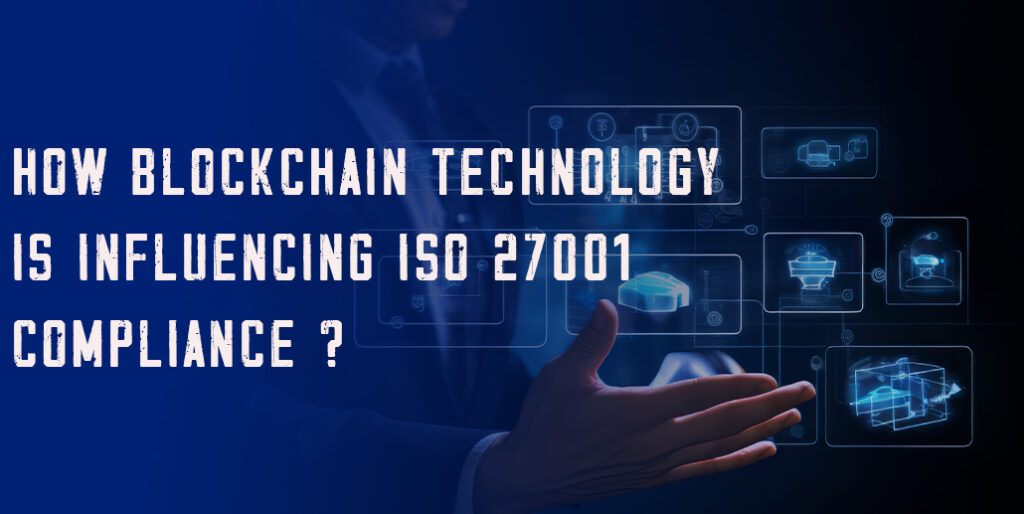
As companies more and more depend on digital infrastructure, cybersecurity and information integrity have become a main priority. ISO 27001 certification, the globally recognized standard for information security management systems (ISMS). Thus, it gives a structured technique to coping with risks and making sure information protection. At the same time, blockchain technology is revolutionizing how corporations secure and control virtual transactions. But, how does blockchain effect ISO 27001 compliance? Blockchain`s decentralized, immutable, and transparent nature aligns with ISO 27001 principles. For instance, providing stronger protection, threat control, and compliance support. In this blog, we will discover how blockchain is influencing ISO 27001 implementation and why companies must keep in mind integrating both for a more potent cybersecurity framework.
Understanding ISO 27001 and Its Security Framework
ISO 27001 is an established framework designed to assist corporations execute and keep an effective ISMS. It has 3 key principles: confidentiality, integrity and availability. Confidentiality talks about making sure that only authorized people can access to sensitive data. Secondly, integrity talks about keeping the accuracy and reliability of information. Lastly, availability talks about making sure records and systems is available when needed.
Thus, to attain compliance, companies should examine dangers, execute protection controls, and constantly monitor threats. With the increase in adoption of blockchain technology, corporations have begun to explore how it is able to enhance compliance efforts.
The Role of Blockchain Technology in ISO 27001 Compliance
- Strengthening Data Integrity: One of the main objectives of ISO 27001 is making sure records integrity. However, traditional databases are at risk of unauthorized modifications, accidental changes, and cyberattacks. Blockchain technology gives an answer by presenting an immutable ledger where transactions cannot be altered after they have been recorded. As a result, this immutability guarantees that all the protection logs, compliance records, and sensitive information stays untampered. Companies can significantly improve their adherence to ISO 27001 data integrity policies by using blockchain technology for audit trails.
- Enhancing Access Control and Authentication: ISO 27001 certification stops any unauthorized access to sensitive data. Many corporations nonetheless depend on outdated password-based authentication structures, that are more vulnerable to cyber threats and breaches. With blockchain technology, organizations can put into effect decentralized identity control and smart contracts for access control. In particular, blockchain-based authentication, corporations can confirm identities securely without counting on a single factor of failure. This as a result strengthens compliance with ISO 27001`s access control requirements.
- Improving Risk Management: Risk evaluation and control are essential elements of ISO 27001 certification. However, traditional threat evaluation models depend on centralized information sources, which may be manipulated or become single factors of failure. In contrast, blockchain`s decentralized structure reduces dependency on primary structures, making it more difficult for cybercriminals to target a single attack point. Moreover, blockchain-powered protection logs offer real-time risk monitoring, permitting companies to proactively control dangers and observe ISO 27001`s threat evaluation guidelines.
- Secure Audit Trails for Compliance Verification: Risk evaluation and control are essential elements of ISO 27001 certification. Traditional threat evaluation models depend on centralized information sources, which may be manipulated or become single factors of failure. Blockchain`s decentralized structure reduces dependency on primary structures, making it more difficult for cybercriminals to target a single attack point. Moreover, blockchain-powered protection logs offer real-time risk monitoring, permitting companies to proactively control dangers and observe ISO 27001`s threat evaluation guidelines.
- Ensuring Supply Chain Security: Many businesses applying for ISO 27001 certification ought to also make sure the safety of their delivery chain networks. Third-party vendors, cloud providers, and service stakeholders introduce more protection risks. Blockchain gives a transparent and verifiable record of transactions within a delivery chain. This makes sure that information shared amongst partners stays real and unaltered. By integrating blockchain into delivery chain management, companies can improve compliance with ISO 27001`s supplier relationship protection requirements.
Challenges of Integrating Blockchain with ISO 27001
While blockchain complements many factors of ISO 27001 compliance, companies need to keep in mind numerous challenging situations before implementation such as: regulatory uncertainty. Blockchain policies are evolving, and compliance frameworks ought to adapt to legal adjustments. Moreover, implementation complexity, in which the enterprise integrating blockchain with existing safety structures requires technical know-how and big investment. Lastly, scalability issues. Some blockchain solutions struggle with processing huge volumes of transactions, which can influence safety performance.
Despite those demanding situations, blockchain adoption is developing as businesses understand its ability to reinforce cybersecurity and compliance efforts.
Future of Blockchain and ISO 27001 Compliance
As cyber threats evolve, businesses will keep looking for advanced solutions to enhance safety and streamline compliance. Blockchain technology is ready to play an important position in the future of ISO 27001 by:
- Enabling automatic compliance verification through smart contracts
- Enhancing cyber risk intelligence sharing throughout decentralized networks
- Reducing third-party risks by making sure clear, transparent and tamper-proof transactions
Businesses that proactively combine blockchain into their ISO 27001 safety techniques will be more ready to deal with future regulatory adjustments and cybersecurity threats.
Conclusion
The synergy between blockchain technology and ISO 27001 gives an effective method to securing data structures. Blockchain is revolutionizing how businesses handle cybersecurity and compliance. From improving information integrity and access control to providing secure audit trails.
As regulatory landscapes evolve, companies ought to stay in advance by adopting advanced technologies. By integrating blockchain with ISO 27001, companies can gain compliance and construct a resilient, future-proof safety framework. For more information, visit our website.
